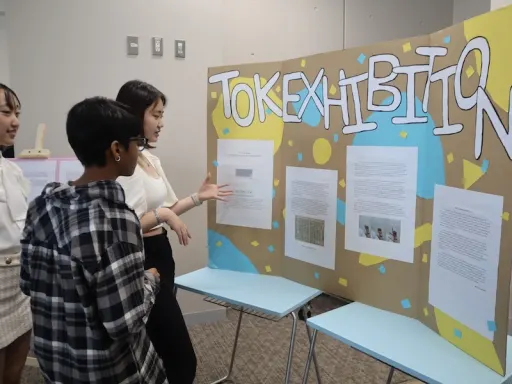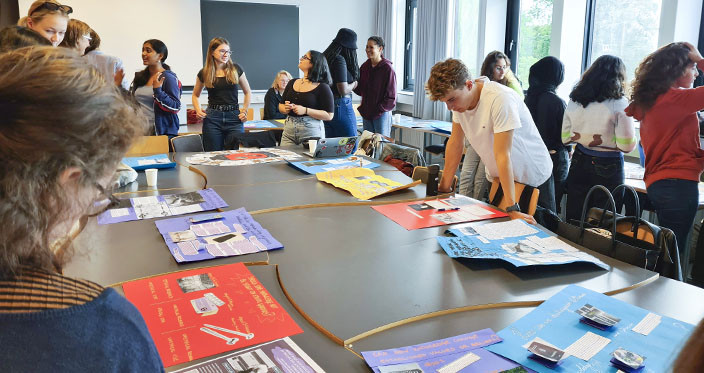How to Write a Good TOK Essay - A 10-Step Guide for IB Students
This post will walk you through how to write a good TOK essay.

Look. While reading your TOK essay, the examiner will ask themselves questions such as:
- Does this essay show a clear understanding of knowledge questions?
- Have you supported your claims and counter claims with relevant, insightful examples?
- How effectively does the essay explore multiple perspectives on knowledge?
- Is there a logical flow that connects each argument to the next?
- Does the essay demonstrate personal engagement and critical reflection?
- Are the Areas of Knowledge (AOK) and Ways of Knowing (WOK) thoughtfully integrated?
Therefore, keeping these questions in mind as you write will guide you to writing a well-rounded TOK essay that meets IB requirements and engages the reader.
And, each step in this guide will help you tackle these crucial elements and more to ensure your TOK essay stands out as a thoughtful and organized piece of work.
Let’s dive right in.

Step 1: Understand the Core Purpose of the TOK Essay
The TOK essay encourages students to reflect on the nature of knowledge rather than simply demonstrate factual understanding.
So, you must understand what the IB program expects — an essay that critically examines “knowledge questions” (KQs) related to different ways of knowing (WOK) and areas of knowledge (AOK).
Think of the essay as an exploration of how humans know what they know.
For example, in the natural sciences, “knowledge” is often based on evidence and the scientific method, whereas in the arts, it might rely more on subjective interpretation and emotion.
When you understand such nuances, you’ll approach your essay with a thoughtful and analytical mindset.
Step 2: Analyze the Prescribed Titles
Each year, the IB provides a list of prescribed titles.
Each title usually presents a unique way to examine knowledge. Some focus on specific AOKs (such as history or ethics). In contrast, others might challenge you to reflect on WOKs like language, reason, or emotion.
When choosing a title, pick one that resonates with you or piques your curiosity.
For example, if you’re interested in how culture influences perception, choose a title that allows you to discuss cultural biases in knowledge formation.
In addition, spend some time brainstorming different ideas for each title to find the one that offers a solid foundation for developing arguments and counter arguments.
Step 3: Craft a Relevant Knowledge Question (KQ)

Your Knowledge Question (KQ) is the foundation of your essay. It sets the stage for the arguments you’ll develop.
A strong KQ emerges from your chosen title and invites deeper exploration rather than a simple answer.
So, when developing your KQ, ensure it’s open-ended, encourages multiple perspectives, and stays relevant to your title.
For example, if the title centers on ethics, your KQ could be, “To what extent do cultural norms influence ethical judgments?” This question isn’t looking for a single solution but rather invites a balanced exploration of how ethics varies across societies and periods.
Another example might be, “How do scientific advancements challenge traditional ethical beliefs?”
This clear, relevant KQ will guide your essay, helping you construct a cohesive argument that remains focused on the title.
It will also ensure you engage with the TOK’s central goals, allowing you to demonstrate your understanding of how knowledge functions and evolves.
Step 4: Organize Your TOK Essay with a Clear Outline
The outline for your TOK essay provides structure and ensures your arguments flow logically from one point to the next.
Hence, start with a three-part structure: introduction, body, and conclusion, each serving a distinct purpose.
- Introduction: Introduce your chosen KQ and briefly explain why it is important. Then, hint at the perspectives you’ll explore, but keep it concise. An effective introduction engages the reader immediately and keeps them interested in reading your essay.
- Body paragraphs: Each paragraph should present one main idea, starting with a claim and then a counter claim. Use specific examples to support each perspective and transition smoothly between arguments to maintain a logical flow.
For example, if you’re discussing ethical knowledge, your first paragraph might discuss a claim about how ethics are universal, while the next presents a counterclaim on moral relativism.
Furthermore, using phrases like “on the other hand” or “in contrast” helps connect your ideas.
- Conclusion: Conclude by summarizing the insights you gained from examining the KQ. Reflect on what this exploration has taught you about the nature of knowledge, and consider any implications or lingering questions.
Step 5: Build Strong Arguments with Claims and Counterclaims

Let’s say your essay focuses on the reliability of historical knowledge.
A claim might state that primary sources provide direct insight into historical events, lending reliability to historical knowledge.
On the other hand, a counterclaim might discuss how primary sources can be biased, as they often reflect the perspectives of those who recorded the events.
Balancing each claim with a counterclaim adds complexity to your argument and demonstrates a nuanced understanding of your KQ.
In addition, this back-and-forth approach enriches your essay, allowing you to explore the complexities of knowledge.
Step 6: Use Specific Examples to Support Your Claims
Examples are the backbone of any TOK essay.
They make your abstract points concrete and show you can connect theory to real-world applications.
Thus, aim for examples from various fields—science, history, personal experiences, or cultural practices.
For instance, if your KQ involves the role of memory in knowledge, you might use the example of eyewitness testimony to demonstrate memory’s fallibility, especially under stress.
Alternatively, if you’re discussing the role of cultural perspectives in knowledge, an example could be how historical accounts of colonization differ significantly depending on the cultural lens through which they are told.
Link each example back to your KQ to reinforce your arguments and keep your essay focused.
Step 7: Integrate Reflection and Personal Insight
A TOK essay is unique because it invites your personal views. Hence, reflecting on your experiences or beliefs can add depth to your analysis.
For instance, if your KQ involves cultural influence on knowledge, you could share a personal experience of learning about a different culture that challenged your assumptions.
This type of reflection makes your essay more authentic and shows how the knowledge question has real-world implications.
Tip : Your insights should be subtle, relevant, and not dominate the essay. The idea is to establish a stronger connection with the reader and make your arguments more compelling.
Step 8: Write with Clarity and Precision

Avoid unnecessary words and stick to a language that conveys your ideas easily. Remember, TOK essays have a strict word limit, so make every word count.
For instance, instead of writing, “It could potentially be suggested that cultural factors sometimes shape historical knowledge,” you could simplify this to, “Historical knowledge is often shaped by cultural factors.”
This streamlined style ensures that your points are easy to follow, allowing the examiner to focus on your argument without getting bogged down in convoluted language.
Step 9: Review and Edit Thoroughly
After you’ve finished your first draft, take a step back before revising.
This break will help you return with fresh eyes, making it easier to spot any areas that need improvement.
Review your essay carefully, checking that each argument is clear, logical, and well-supported by examples.
Reading your essay aloud is a great way to catch awkward phrasing and identify areas that could be rephrased for clarity.
Step 10: Use Coursework Grading Tools, AI, and a Plagiarism Checker
Before submitting your essay, take advantage of resources that can help refine it.
For instance, Revision Dojo’s coursework grading tool and AI-powered plagiarism checker can analyze your essay for structure, clarity, and originality.
The grading tool gives feedback on the organization and flow of your arguments, while the plagiarism checker ensures that your work is original and meets IB’s standards of academic integrity.
Furthermore, the tools can help identify last-minute improvements, giving you confidence that your essay is well-structured and polished for submission.
Final Thoughts
There you have it - that’s how to write a good TOK essay.
Following these ten steps, you can craft a well-organized, thoughtful TOK essay that engages with complex knowledge questions.
From selecting a title and creating a solid outline to using resources like Revision Dojo tools, each stage brings you closer to an essay that shows critical thinking
Speaking of Revision Dojo, you can join the platform free using the link below.
Join the Dojo
Ace your exams with RevisionDojo
- Thousands of practice questions
- Study notes and flashcards for every topic and subject
- Free Jojo AI tutor

RevisionDojo, saved my exams. I went from a 4 to a 6 in math, a 5 to a 7 in econ and a 5 to a 7 in chem. ”
Joseph Chan
IBDP student
Rated Excellent
On Trustpilot
- [email protected]
- Get 21% OFF . Use the code: FIRST21

IB TOK Essay Rubric. Grading Criteria
As someone deeply immersed in the IB curriculum, I’ve encountered difficulty writing Theory of Knowledge (TOK) essays more times than I can count. Today, I’m here to tell you about the IB TOK essay rubric and grading criteria, offering insights I’ve gathered over the years. Trust me, understanding these elements can transform your TOK essay from good to exceptional.
What Is IB Theory of Knowledge Essay?
The International Baccalaureate TOK essay is a critical element of the IB Diploma Programme that pushes students to ponder the nature and acquisition of knowledge. This task requires students to examine and articulate their understanding of how we come to know what we claim to know, engaging them in a deep reflection on knowledge itself, its sources, and its application in various contexts.
This essay is a philosophical research that encourages critical thinking and analysis across different areas of knowledge, including ethics, science, mathematics, and the arts. At the heart of the IB TOK essay are several key components that students must know:
- The essay prompts students to reflect on the nature of knowledge and how we come to know what we claim to know. It is an exercise in critical thinking and philosophy, where students examine the bases of knowledge and how it intersects with the world around them.
- Students choose from a list of prescribed titles the IB organization releases annually. These titles prompt discussions on various topics in knowledge, ethics, science, mathematics, human sciences, and more.
- There is a maximum TOK essay word count of 1,600 words. This strict limit requires students to articulate their thoughts clearly and concisely.
- The essay is assessed using criteria that evaluate students’ ability to identify and research knowledge issues, contrast TOK key concepts , demonstrate critical thinking, and organize their ideas coherently.
- Students are encouraged to start early, select a topic that interests them, and engage in extensive research and critical thinking. Collaboration with TOK teachers for guidance and feedback throughout the writing process is also crucial.
- Through the TOK essay, students develop skills in critical thinking, analysis, synthesis of information from various disciplines, and the ability to argue coherently and persuasively.
The TOK essay and the TOK exhibition contribute up to three points towards the total score of the IB Diploma. The performance in TOK is combined with the Extended Essay (EE) to determine the number of additional points awarded.
You Might Also Like:
- November 2024 TOK Essay Titles
- TOK Exhibition Word Count
- TOK Essay Word Count
- How to Write TOK Essay in One Week
- IB TOK Essay Structure in Detail
- AOKs in IB TOK
- 12 TOK Key Concepts with Examples
- The Human Sciences AOK in TOK
- The Natural Sciences AOK and Its Significance in TOK
IB Theory of Knowledge Essay Rubric
As an IB writer and mentor, I’ve seen these guidelines as a checklist and a map for writing insightful, coherent works in the IB Theory of Knowledge . My goal here is to explain these criteria.

Addressing the Knowledge Question (0-2 points)
A central component of the TOK essay is its focus on a knowledge question directly related to the chosen title. This question must be explicitly identified early in the essay as a foundation for your analysis and arguments. The clarity with which you state this question and the extent to which it informs the development of your essay is crucial for scoring in this category.
Grasping Knowledge Issues (0-2 points)
Your essay must profoundly comprehend the knowledge issues connected to your central knowledge question. It includes recognizing the diverse methods through which knowledge is obtained and acknowledging the potential limitations and biases influencing our perception of the world. A high score in this area reflects your ability to dig into these complexities and present them thoughtfully within your essay.
Critical Analysis and Evaluation (0-2 points)
A critical dissection and assessment of the knowledge question are imperative in your TOK essay. It involves using relevant examples and evidence to bolster your arguments alongside a meticulous examination of the various approaches to knowledge, highlighting their strengths and pitfalls. Additionally, it includes appraising the comparative worth of these different approaches and showcasing your ability to engage with the question at hand critically.
Incorporating AOKs and WOKs (0-2 points)
our essay must showcase an adept understanding of the multifaceted nature in which knowledge is acquired, highlighting the roles of empirical evidence, logical deduction, and personal experiences. Equally important is demonstrating a thorough grasp of the various Ways of Knowing (WOKs) — including reason, emotion, perception, and language — and articulating how these intersect and interact with the central knowledge question. A high score in this criterion indicates a comprehensive integration and consideration of AOKs and WOKs in your analysis.
Demonstrating Personal Engagement (0-2 points)
Your TOK essay should vividly reflect your connection and engagement with the knowledge question. It should show your awareness of how the arguments presented resonate with your experiences and perceptions and their broader implications for the world you inhabit. Achieving high marks in this area means successfully conveying how researching the knowledge question has influenced your understanding and perspective, integrating personal insight with academic analysis.
Coherence and Structure (0-2 points)
A well-written TOK essay is characterized by its organization and clarity, featuring a distinct introduction, body, and conclusion. The arrangement should be logical and enhance the essay’s central argument, ensuring a seamless flow of ideas from start to finish. High scores in this domain are awarded to essays demonstrating meticulous planning and an ability to guide the reader.
Clarity in Presentation (0-2 points)
Your TOK essay should be articulated clearly, concisely, and well-structured, paying close attention to the accuracy of grammar, spelling, and punctuation. It is also essential to adhere to the proper referencing and citation style throughout the document. Essays that score well in this category prioritize readability and scholarly integrity, making it easy for the reader to follow and appreciate the depth of the analysis. So, follow the IB TOK essay structure in detail.
Innovative Approach and Creativity (0-2 points)
Your TOK essay should exhibit originality and inventiveness in addressing the knowledge question and selecting examples and evidence to bolster your arguments. High-scoring essays in this category are characterized by their creative insights and the ability to think outside the box, demonstrating a proactive approach to elucidating the knowledge question.
Get Help With Your Paper
Ib tok essay grading criteria explained.
The grading criteria for the TOK essay follow a holistic approach, considering all aspects of the rubric. Essays are marked on a scale, with each level reflecting a range of performance in the criteria mentioned above. Here are some insights:
- Excellent Performance . Essays in this category exhibit a deep understanding of knowledge issues, sophisticated analysis, and clear, coherent organization. They effectively incorporate multiple perspectives and are enriched with well-integrated examples.
- Good Performance . These essays demonstrate a good understanding and analysis of knowledge issues, though they may lack the depth or coherence of the top-tier essays. The organization is solid, and examples are used effectively, though perhaps with less sophistication.
- Satisfactory Performance . Here, essays adequately understand the knowledge issues but may struggle with in-depth analysis or coherent organization. Using examples and considering different perspectives is present but not fully developed.
- Basic Performance . Essays in this range have a basic grasp of the knowledge issues but significant weaknesses in analysis, organization, and examples. They may overlook essential perspectives or implications.
From my experience, the key to excelling under these grading criteria lies in understanding what each criterion asks for and integrating these elements into a cohesive, compelling narrative. Crafting your essay with an awareness of these grading nuances can elevate your work from satisfactory to exceptional.

Passing Grade for the Theory of Knowledge Essay
The TOK essay and the TOK presentation form part of the core of the IB Diploma Programme, and students must pass both components to receive their diploma. The TOK essay and presentation are graded on a letter scale of A (excellent) to E (elementary), with D considered a passing grade. However, it’s important to remember that the final TOK grade is combined with the Extended Essay grade, which can significantly impact your overall diploma points.
You generally need to avoid receiving an E grade to pass the TOK component. The combined points for TOK and the EE can contribute up to 3 bonus points towards your diploma, depending on their combined quality. Scores are determined by a matrix that the IB updates periodically, so aiming for the highest possible grades in TOK and EE is crucial to maximizing your diploma points.
Remember, the specific criteria for passing can vary slightly with changes to the IB curriculum and assessment guides, so it’s always a good idea to consult the latest materials or speak with your TOK teacher for the most current information.
In summary, passing the TOK essay requires a comprehensive understanding of the knowledge issues, a critical and reflective approach to the essay question, and a commitment to articulate your thoughts clearly and coherently.
So, mastering the IB TOK essay rubric and grading criteria is a worthwhile path. It’s not just about securing high marks; it’s about developing a nuanced understanding of knowledge. As you prepare to tackle your TOK essay, carry with you the insights and strategies shared.
So, start early, seek feedback, and let your understanding of the rubric infuse every paragraph of your essay. With the right approach, the TOK essay expands your horizons of learning. Good luck, and remember, our experts are always by your side and can help you with the TOK essay .

Valerie Green
Valerie Green is a dedicated educator who spends her time helping high school and college students succeed. She writes articles and guides for various online education projects, providing students with the tools they need to excel in their studies. Friendly and approachable, she is committed to making a difference in the lives of students.

Tips for Writing a High-Scoring IB Essay
The IB rewards essays that are focused, analytical, and well-structured. In this guide, we’ll share practical tips for success, from using evidence effectively to polishing your arguments through thoughtful revisions.

The Benefits of Joining IB Study Groups
You may change the way you tackle the demanding requirements of the IB program by joining an IB study group. These groups provide a collaborative learning environment in addition to sharing notes and study sessions.

How to Handle Stress and Pressure During IB Exams?
Dealing with the stress and pressure of IB exams can be challenging, but it’s manageable with the right strategies. In this article, I’ll give you practical tips on how to stay calm and focused during exam season. From setting up a balanced study routine to developing a positive mindset and using effective stress reduction techniques, these methods will help you approach IB exams with confidence.

The Role of TOK in Interdisciplinary Understanding
TOK encourages students to look into how different types of information connect and combine, which leads to a more all-around way of learning. TOK acts as a link between subjects that might otherwise seem unconnected, such as relating mathematical ideas to natural patterns or examining the moral ramifications of science developments.

How to Conduct Effective Peer Reviews in IB Projects?
Peer review in IB projects is a vital skill that can greatly improve the quality of your projects and your academic growth. From what I’ve seen, peer reviews are a great way to get helpful feedback, see things from different angles, and make your work better.

Utilizing Digital Tools for IB Study and Research
Now that we live in a digital world, using technology to its fullest can greatly improve your IB study and research. Staying prepared, controlling time, and conducting research have never been simpler thanks to the abundance of apps and platforms available. The important thing is to know which tools will help you reach your school goals.
© 2024 I Bstudenthelp.com. This website is owned and operated by Udeepi OU Harju maakond, Tallinn, Lasnamäe linnaosa, Sepapaja tn 6, 15551. Disclaimer : Services we provide are only to assist the buyer like a guideline to complete any kind of writing assignment. Privacy Policy Terms and Conditions Cookie Policy Revision Policy Refund Policy
- [email protected]
- +65 82281164

A Comprehensive Guide to ToK Essays and Exhibitions for 2025

Explore the detailed guide to mastering ToK essays and exhibitions for 2025, with expert tips and insights.
What is the Theory of Knowledge (ToK)?

Theory of Knowledge (ToK) is a core component of the IB Diploma Programme . It encourages students to explore how we acquire knowledge and to reflect on the processes behind it. Rather than focusing on learning new facts, ToK asks you to think critically about how knowledge is constructed in areas such as science, history, ethics, and art. It also considers how different ways of knowing—like reason, emotion, and language—shape our understanding.
The ToK Essay: May 2025 Titles

For the ToK essay, you will need to choose from six prescribed titles , each challenging you to examine knowledge issues through different Areas of Knowledge (AOKs) and Ways of Knowing (WOKs). These titles push you to analyze how knowledge is formed, challenged, or valued. Below are the titles for the May 2025 essay:
- “Are some types of knowledge more useful than others?”
- “Does the pursuit of knowledge always require a justification of methods?”
- “Do values shape how knowledge is produced?”
- “Can there be knowledge that is independent of language?”
- “Is bias inevitable in the production of knowledge?”
- “Does knowledge change over time or simply accumulate?”
Breaking Down the Titles

Title 1: “Are some types of knowledge more useful than others?”
This question asks you to compare the usefulness of different types of knowledge. While scientific knowledge might seem most practical (think medicine or technology), arts and history play essential roles in shaping societies and personal perspectives.
Example: While medical knowledge saves lives, historical knowledge helps prevent past mistakes from being repeated. Is one more useful than the other? It depends on the context.
Tip: Define “usefulness” from multiple angles—societal, ethical, or personal—to provide a comprehensive response.
Title 2: “Does the pursuit of knowledge always require a justification of methods?”
Here , you’ll explore whether methods of gaining knowledge always need to be justified. For instance, in science, methods must be thoroughly explained, but in art, does creativity need the same kind of justification?
Example: A scientific experiment requires methodical justification, while an artist may create intuitively without needing to explain their process.
Tip: Compare areas like science, where methods are rigorously justified, with others like art, where intuition may be sufficient.
Title 3: “Do values shape how knowledge is produced?”
This title explores how cultural, societal, and personal values influence the production of knowledge. Ethical considerations can impact scientific research, while historical narratives often reflect national or cultural values.
Example: Ethical values guide research in genetics, and cultural values shape which historical events we study.
Tip: Examine how values limit or influence knowledge production in different areas, such as science or history.
Title 4: “Can there be knowledge that is independent of language?”
This question asks whether knowledge can exist without language. While visual or mathematical knowledge might not need words, how do we share and interpret these ideas without language?
Example: Mathematical equations might seem independent of language, but we use words and symbols to explain them.
Tip: Consider areas like art or mathematics where language seems less necessary, but question whether true knowledge can exist without it.
Title 5: “Is bias inevitable in the production of knowledge?”
Every individual’s background, culture, and beliefs can introduce bias into knowledge production. While scientists aim for objectivity, even in their field, societal factors can influence the research questions they pursue.
Example: Historians often interpret events through their own lens, while scientists strive to reduce bias through peer review.
Tip: Investigate how bias affects different areas of knowledge and whether it can truly be eliminated.
Title 6: “Does knowledge change over time or simply accumulate?”
This title asks whether knowledge evolves or just builds on previous discoveries. In science, new knowledge often accumulates, while in history and ethics, our understanding may change entirely with new perspectives.
Example: Medicine builds on past discoveries, while historical knowledge may change with fresh interpretations of past events.
Tip: Show how knowledge evolves in some fields and accumulates in others. Discuss what drives these changes, such as new evidence or shifts in societal values.
Tips for Writing the ToK Essay

- Understand Your Title: Take time to fully comprehend your chosen title, thinking deeply about what it asks.
- Use Relevant Examples: Strong, real-world examples are crucial. They should connect directly to the AOKs you’re discussing and support your argument.
- Stay Structured: Begin with a clear introduction, organize your ideas logically, and end with a strong conclusion.
- Balance Perspectives: Acknowledge complexity by considering multiple viewpoints or counterarguments.
- Add Personal Insight: Don’t hesitate to draw on your own experiences where appropriate.
The ToK Exhibition

Alongside the essay, the ToK exhibition is an important component. It requires you to select real-world objects and relate them to a specific prompt. For example, you might choose a news article, a piece of art, or a scientific tool, and connect it to a ToK question like “What counts as knowledge?”
Tips for the Exhibition:
- Choose Objects Carefully: Ensure your objects clearly connect to the knowledge question you’re exploring.
- Explain the Connection: Be concise and clear about how each object ties into your chosen prompt.
- Creativity Is Good, But Relevance Is Key: Choose objects with real-world relevance and meaning to the topic.
General ToK Tips

- Engage with Core Questions: Always return to the central ToK questions—”How do we know?” and “What counts as knowledge?” These should guide both your essay and the exhibition.
- Stick to the Word Limit: For the essay, keep to the 1,600-word limit. Each paragraph should contribute directly to your argument.
- Seek Feedback: Before submitting, ask for feedback from teachers or peers. It will help you identify areas for improvement.
- Reflect on Your Learning: Since ToK is reflective, consider how your own experiences influence your understanding of knowledge.
By carefully analyzing the titles, selecting strong examples, and applying critical thinking, you’ll be able to excel in both the ToK essay and exhibition. Remember, ToK is less about finding the “right” answer and more about presenting well-supported arguments.
Need extra support? Young Scholarz can help! We offer expert guidance to equip you with the tools for academic success. Whether you need help with skill development, literature analysis, or exam prep, our team is here to support your learning journey. Follow us on Instagram: @youngscholarz for tips and updates.
Author : Suchismita Sanyal
Related Posts

Blog , Books , Exams , General , IB , IGCSE , Learning , Study Tips
December 13, 2024

Extra Curriculars , General , News
December 10, 2024

December 5, 2024

Blog , Books , Exams , General , IB , Learning , Study Tips
November 22, 2024

November 14, 2024

- Posted on October 17, 2024
- Suchismita Sanyal
Ready to start your lifelong journey with us?
We guarantee an improvement in grades, with most students improving by an average of 2 bands.

IMAGES
COMMENTS
Making sure your evidence actually supports your claims and counterclaims is one of the toughest aspects of the essay. The TOK Essay Structure. Our structure for the TOK essay has 4 sections (6 paragraphs) overall. First, write your introduction. (100-150 words) Paragraph 1-Say one or two interesting things about the prescribed title question ...
Sep 12, 2023 · Learn more about theory of knowledge. You can also find examples of TOK essay titles and read about how the IB sets deadlines for TOK. You may also be interested in the other components of the DP core: creativity, activity, service (CAS) and the extended essay. Learn more about TOK in a DP workshop for teachers.
TOK ESSAY Student’s Guide (some of the texts in the content of this guide are taken or adapted from the IB TOK Guide) Introduction According to the IB, the TOK essay “engages students in a formal, sustained piece of writing in response to one of the six titles that are prescribed by the IB for each examination session.
May 10, 2024 · This guide contains our recommendations on formatting and structuring such essays. We base our tips on our extensive experience helping IB students achieve the best marks for their coursework. TOK essay format and structure . A TOK essay should include the following: the introduction, 1st Area of Knowledge, 2nd Area of Knowledge, and the ...
Suggested structure (see also the exemplar essay plan) Element Description No. words (approx) Introduction Include a ‘hook’ to interest the reader Explain the key terms of your title, and how you will be interpreting them Refer to the scope of your essay plan - specifically the AOKs that you will explore 200 words
Jun 6, 2023 · Further guidance on the TOK essay and exhibition can be found in the IB’s Programme Resource Centre (PRC). Materials in the PRC are only available to existing IB World Schools. These materials are free. There are a number of resources on TOK in the IB Store, which are available to everyone. Find out how to become an IB World School.
Nov 25, 2024 · Step 1: Understand the Core Purpose of the TOK Essay The TOK essay encourages students to reflect on the nature of knowledge rather than simply demonstrate factual understanding. So, you must understand what the IB program expects — an essay that critically examines “knowledge questions” (KQs) related to different ways of knowing (WOK ...
Oct 25, 2024 · IB TOK Essay Structure in Detail; AOKs in IB TOK; 12 TOK Key Concepts with Examples; The Human Sciences AOK in TOK; The Natural Sciences AOK and Its Significance in TOK; IB Theory of Knowledge Essay Rubric. As an IB writer and mentor, I’ve seen these guidelines as a checklist and a map for writing insightful, coherent works in the IB Theory ...
Y ou r essay wil l b e m ark ed b y an ex ternal I B ex am iner and g iv en a score ou t of 10. These. 10 p oints are div ided into 5 l ev el s, rang ing f rom ' ex cel l ent' to ' ru dim entary ' . Y ou r g oal is to p rov ide a cl ear, coherent, and critical ex p l oration of the chosen essay
Oct 17, 2024 · Theory of Knowledge (ToK) is a core component of the IB Diploma Programme. It encourages students to explore how we acquire knowledge and to reflect on the processes behind it. Rather than focusing on learning new facts, ToK asks you to think critically about how knowledge is constructed in areas such as science, history, ethics, and art.